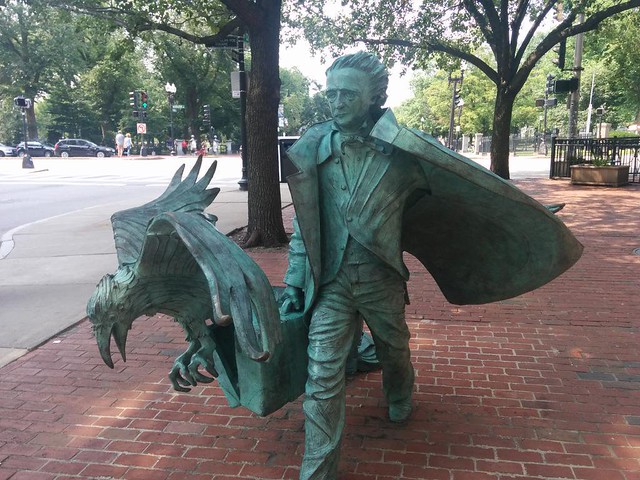The hardest part of being a PhD intern at the Social Media Collective last summer happened on weekday mornings. On those mornings, when I joined the optional Writing Power Hour, we would sit together at a long table overlooking the Charles River and write. For one or two hours, we committed to silence, collectively focusing on our work.
For a community of caring scholars who love sharing ideas and love to be with each other, staying quiet was no small challenge– and not just because Tarleton Gillespie and Mary Gray seem full of energy and perpetually on the cusp of a mischievous joke. Everyone is just too curious to stay in their own heads for very long.
My summer at MSR New England has been an important part of my development as a researcher. Coming right after the exhausting, enriching ordeal of general/qualifying exams, it was exactly what I needed to step back, plunge my hands into a research project, and set the stage for my dissertation (also, I learned to sail!).
Are you a PhD candidate who’s finished your qualifying/general exams? Apply for the Social Media Collective PhD internship by January 29. Go on; it’s an amazing opportunity!
I came to social computing via a very unusual path, starting with postcolonial literature and computer science, continuing into startups and nonprofits, and then landing at the MIT Media Lab, where we tend to avoid disciplinary thinking. Over 4.5 years at MIT, I’ve come to see the deep importance of situating our discussions about design, data, and social change into a wider understanding of the issues and cultures our work engages with. And so the focus of my work has shifted to include theories and methods from sociology. My general exams focused on theories of civic life, quantitative methods for studying social movements, and theories of immaterial labor, as I tried to make sense of what it means for citizens to take on the work of understanding and responding to social problems online.
The Social Media Collective was the perfect place to bring those readings and theories into a concrete summer research project. But it was much more than that. My time with Nancy, Mary, Tarleton, Aleena, Stacy, Ifeoma, Andrea, Kevin, Sarah, Lana, and the rest of MSR New England was a valuable time to soak in a deeply generous and meaningful vision of what it means to be a scholar in the world.
What To Expect from an Internship at Microsoft Research New England
- Mentorship and personal support from deeply thoughtful scholars at the top of their fields, who will be genuinely committed to your personal growth
- Intellectual freedom. Other corporate internships prioritize the contribution you make to the company, vetting your research before publication, while MSR strongly supports you to make a scholarly contribution first and foremost.
- 12 weeks to design and carry out one full study. On one hand, the time passes very quickly. On the other hand, you will be able to dedicate all of your time to making that research excellent
- Regular feedback and brainstorming on your research project
- Companionship, conversation, and adventures with other thoughtful PhD candidates, including other interns from economics, mathematics, and computer science
- Intimate conversations with scholars who cycle through. Over the summer, I enjoyed deeply helpful lunches with Fred Turner, Annette Markham, Henry Jenkins, and many others.
- Opportunities to reflect on the arc of your career with people who have a wide view of the fields you work in
- Access to other research communities in the Boston area. This past year, PhD interns gave talks at the Berkman Center for Internet and Society
- Access, in some cases, to conversations with other parts of the company, if relevant to your research
- Life in Boston/Camberville, which is wonderful
- A 9-5 schedule, and consequently, a chance to regenerate partway through your PhD
- Generous compensation, including funds to cover travel, accommodation, and more
- An opportunity designed to be family friendly throughout, including company-wide social gatherings (I attempted to eat lobster for the first time, and it totally defeated me)
- An inclusive and caring work environment that embodies mutual respect for people of all identities and beliefs
- An amazing view
I will always remember how open and honest Nancy, Mary, Tarleton, and the others were about the state of their work and the challenges they faced. As someone who’s not normally surrounded by qualitative researchers, I found it deeply helpful to listen as they talked through the daily struggles of their research. The researchers at SMC all share a special kind of experienced and confident humility about doing good work that offered me a helpful model for what it means to be a researcher of integrity. I already knew from hard experience the importance of being puzzled and getting stuck. But I learned much by watching Social Media Collective researchers articulate their challenges and work through them.
Among the many wonderful seminar conversations we shared, I especially loved our extended conversation with Henry Jenkins about how to harmonize the work of being a public intellectual while also doing high quality research that other scholars validate.
My Summer Research at MSR: Online Harassment and the Work of Moderators Online
I came to MSR fresh from research on the challenges of reviewing and responding to harassment on Twitter, alongside a semester of wide reading in social movement theory and research on digital labor. Within the first week, I confirmed my decision to spend the summer looking at the work of moderators on reddit. Mary, Nancy, Tarleton, and Annette offered deeply helpful feedback and ideas on how to go about studying the work of moderators. A few weeks later, when moderators of 2,200 subreddits joined a social movement to halt operations and pressure the company to change how it treats moderators, they helped me decide what data to collect as the event unfolded.
I’ve written extensively about my process on the Social Media Collective blog, and the result can be seen in the article just accepted by CHI (preprint). In the paper, I investigate this key moment through a novel approach of “participatory hypothesis testing”– building on my qualitative findings to bootstrap a participatory process of doing data science together with redditors. Here’s how I define the method in my paper:
To describe factors in collective action against platform operators, this paper carries out mixed methods participatory hypothesis testing, an approach to action research online that combines methods from virtual ethnography and quantitative analysis. This study’s methods are drawn from the action research tradition, which began in the 1930s with studies by factory workers and university-based researchers in the early years of social psychology. Setting out to produce knowledge with and for workers rather than solely for factory operators, researchers and workers collaborated on studies to answer questions about leadership, cooperation, and management that were led by worker interests.
[….] data collection and question formation in this paper have taken three forms. Firstly, among qualitative methods, the researcher carried out content analysis of [reddit posts, articles, and interviews] …. Secondly, the researcher collected trace data from the reddit API… Finally, the researcher collaborated with reddit users, using a popular data approach to define hypotheses and interpret the results of logistic regression models predicting subreddits’ participation in the reddit blackout.
My summer at MSR was the perfect environment to develop the mixed methods approach that I needed to study the reddit blackout. While PhD interns are not allowed to bring their Microsoft work into their PhD, I have been able to build on the knowledge and relationships I developed last summer.
Research and Learning Beyond My Main Project
Anyone who knows me will know that it’s tough for me to exclusively focus on one thing at a time. While I was at MSR, I also:
- Coordinated and (mostly) completed the Online Harassment Resource Guide to academic literature
- Published a working paper with Hanna Wallach on Modeling Gender Discrimination By Audiences of Online News
- Joined a day-long conference on civic media, hosted by Microsoft New England’s Civic Tech group.
Amidst all of the support and encouragement I received, I was also very much on my own. PhD interns are given substantial intellectual freedom to pursue the questions they care about. In consequence, the onus is mostly on the intern to develop their research project, justify it to their mentors, and do the work. Tarleton and Mary asked me good, supportive, and often helpfully hard, critical questions, but my relationship with them was not the relationship of an RA to a PI– instead it was the relationship of a junior colleague to senior ones.
I remember realizing my level of independence about 4 days into the internship — that I was basically my own boss and that I needed to take full responsibility for my research rather than expect anyone to tell me how to go about my work. The PhD internship is *not* a collaborative apprenticeship like my 2013 internship at MSR Fuse Labs. As a PhD candidate, I was expected to pursue my own research agenda, even as I benefitted from guidance and feedback from Social Media Collective researchers.
So Apply Already!
Having observed the experiences of many Social Media Collective interns from my perch at MIT just a few blocks away from MSR New England, I can confidently say that pretty much every PhD intern experiences as much mentorship and opportunity in the same supportive environment as I did. So what are you waiting for. Apply already!



